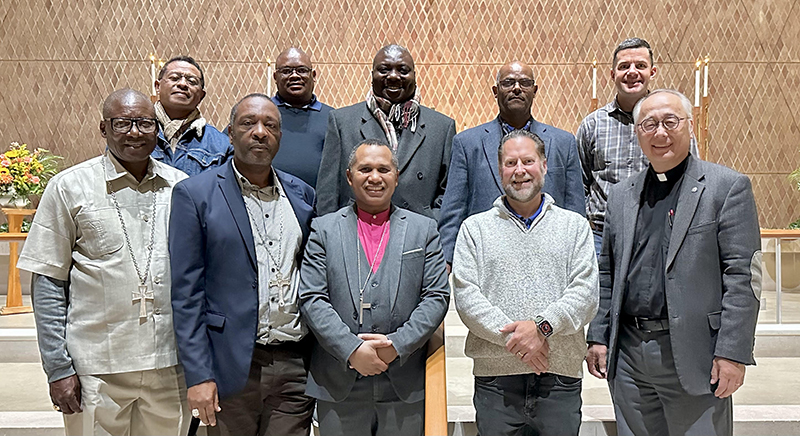
USA – The Lutheran Leadership Development Program (LLDP) held its eighth session at Concordia Theological Seminary in Fort Wayne, Indiana (CTSFW) from November 6-17, 2023. This session offered courses on the ecumenical movement and hermeneutics.
November’s classes also saw the LLDP welcome three new participants into the second cohort of students: Rev. Martin Paul of the Free Evangelical Lutheran Synod in South Africa (FELSISA), who serves as Third Minister in its Synodical Council; Rev. Ambele Mwaipopo, Bishop of the Lake Tanganyika Diocese of the Evangelical Lutheran Church in Tanzania (LTD-ELCT); and Rev. Jackson Mushendwa, Bishop of the Western Diocese of the ELCT (WD-ELCT).
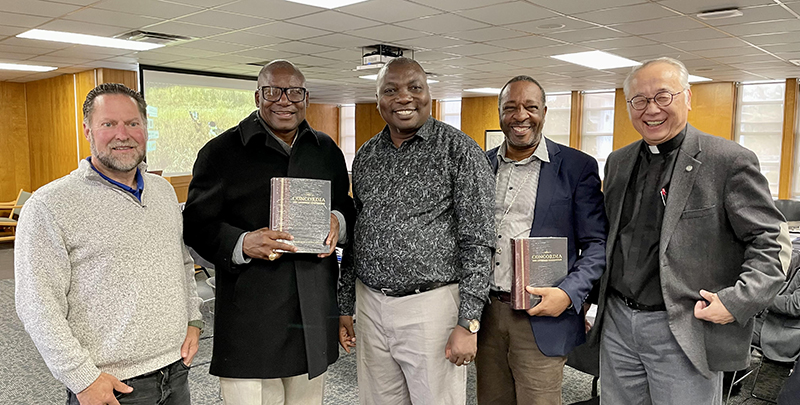
Rev. Dr. Albert Collver, former ILC General Secretary, taught “World Lutheranism and the Ecumenical Movement” during the first week. This is one of the most important courses the LLDP offers, helping participants to understand the history of their own church better, as well as the organizations that their churches belong to. They also learn about church fellowship from a confessional Lutheran perspective. One bishop called the class “perfect,” saying it “has helped me to be capable of understanding and teaching what fellowship really is.” Another participant expressed gratitude for the “clear understanding” the instruction had brought him “in terms of church fellowship in the ecumenical context.”
Dr. Collver was pleased with the outcome of the class, observing that students had “increased their understanding of the Lutheran confession of fellowship” and “are resolved to teach this in their church bodies and dioceses.” His presentation, which contrasted the ILC’s understanding of fellowship with the liberal model taught by other world groups, encouraged participants to remain faithful to the confessional Lutheran position, articulated especially in Article 7 of the Augsburg Confession.
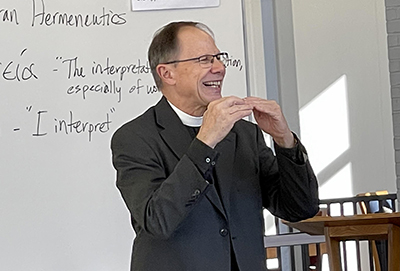
Dr. Charles Gieschen, CTSFW’s Provost, taught the second class of the November session: “Lutheran Hermeneutics.” The course enables participants to understand and criticize recent directions in biblical interpretation from a confessional Lutheran perspective, including the historical-critical method and several reader-oriented trends in hermeneutics. “The course has been inspiring,” one participant noted. “Professor Gieschen was great in pinpointing key areas of importance in hermeneutics both in history and practice. He has equipped us with the necessary skills for the interpretation of the Bible.”
“Our November session was another great success,” commented Rev. Dr. Naomichi Masaki, Director of the LLDP. “Working with such respected scholars and churchmen like Dr. Collver and Dr. Gieschen is a privilege and an honour. But what brings me the most tremendous joy and gratitude to the Lord is that our participants keep on growing in their understanding of sound doctrine and committing themselves to be faithful to the Saviour, Jesus Christ—even when doing so sometimes brings major sacrifices.”
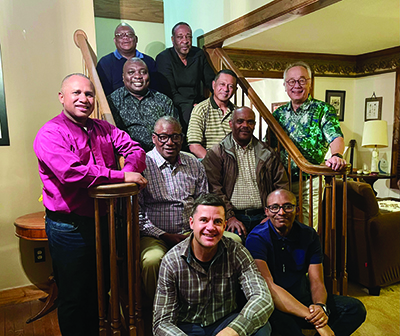
“Our participants rejoice in the doctrine that Jesus has taught the whole Church,” he continued. “By listening to what the Lord speaks, and in receiving His gifts with eager thankfulness and praise, our participants are saying back to Him what He has said to them. They repeat, yes, confess, the Lord Jesus Christ. To witness to these wonderful things in each of our participants gives me joy that words cannot express. I continue to pray for our participants and their church bodies with deepest respect and thanksgiving. We rejoice in our partnership in the Gospel.”
The LLDP is a graduate-level program of the ILC dedicated to equipping confessional Lutheran leaders around the world with the theological and practical knowledge necessary to serve their church bodies effectively.
You can support the work of the Lutheran Leadership Development Program by making a donation online. You can also mail a donation by cheque to:
International Lutheran Council
PO Box 10149
Fort Wayne, Indiana 46850 USA
———————

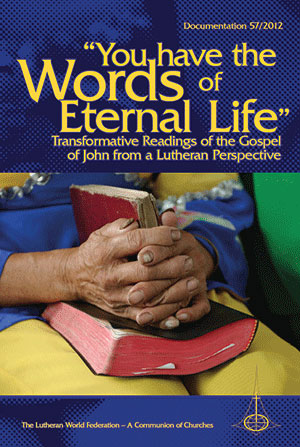 The document in question, “You have the Words of Eternal Life”: Transformative Readings of the Gospel of John from a Lutheran Perspective (Documentation 57/2012)—henceforth Transformative Readings—, is edited by Rev. Dr. Kenneth Mtata, the LWF’s Study Secretary for Lutheran Theology and Practice in its Department for Theology and Public Witness. In a preface to the work, LWF General Secretary Martin Junge notes that, “in 2011, the Lutheran World Federation (LWF) embarked on a hermeneutics program in order to nurture [the] desire to ‘read’ shared sacred texts and contexts.” “It is vital to take seriously the witness of past interpretations,” he writes, “and to relate them to contemporary ones.” To that end, Transformative Readings represents “the result of the LWF’s first, international hermeneutics consultation.”
The document in question, “You have the Words of Eternal Life”: Transformative Readings of the Gospel of John from a Lutheran Perspective (Documentation 57/2012)—henceforth Transformative Readings—, is edited by Rev. Dr. Kenneth Mtata, the LWF’s Study Secretary for Lutheran Theology and Practice in its Department for Theology and Public Witness. In a preface to the work, LWF General Secretary Martin Junge notes that, “in 2011, the Lutheran World Federation (LWF) embarked on a hermeneutics program in order to nurture [the] desire to ‘read’ shared sacred texts and contexts.” “It is vital to take seriously the witness of past interpretations,” he writes, “and to relate them to contemporary ones.” To that end, Transformative Readings represents “the result of the LWF’s first, international hermeneutics consultation.”